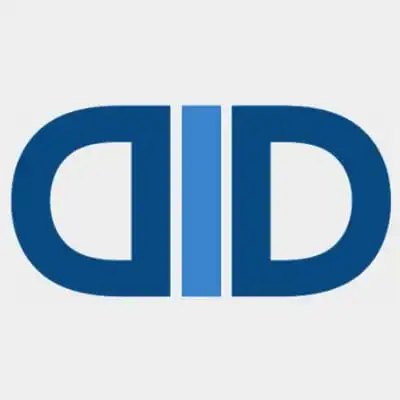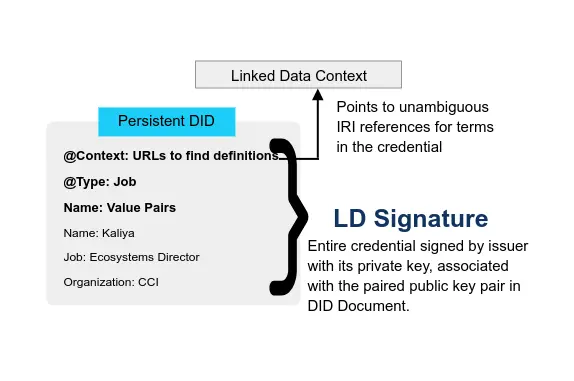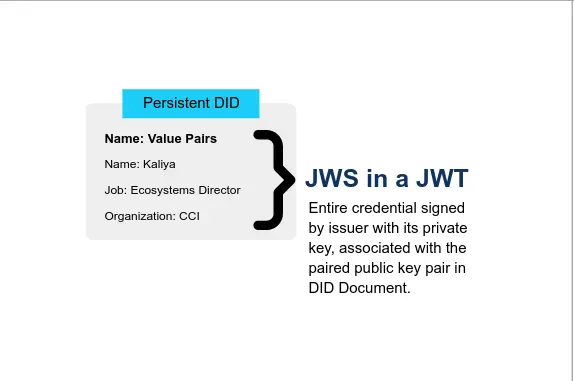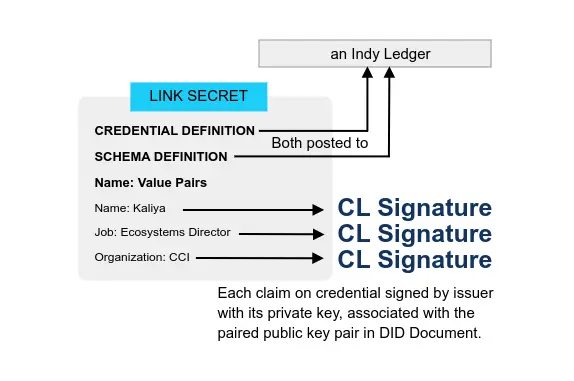Blockcerts
Learning Machine
- Digital Identity From: Learning Machine Type: Page Date: 2018-10-06
- Learning Machine From: Learning Machine Type: Company Date: 2016

- Natalie Smolenski - Author, Speaker By: Natalie Smolenski Type: Blog
- Academic Credentialing and the Blockchain From: Learning Machine Type: Page Date: 2016-10-28
- Future Proof From: Hyland Credentials Type: Page Date: 2017-07

A framework for organizing the categories of digital identity and an analysis of where disruptive innovation is most likely to succeed.
Get a complete system to issue digital credentials in a blockchain-secured format that is easily shareable and instantly verifiable anywhere in the world.
Natalie Smolenski is an anthropologist leading business development for blockchain technology firm Learning Machine. She writes and speaks about identity, tech, and government.
Hello everyone. My name is Chris Jagers. I’m the CEO of Learning Machine, the software company that has been working with MIT over the last year to develop an open standard for blockchain certificates. I’ll be giving a short presentation about blockchain-based academic credentials, followed by a discussion with our panel and with all of you.
Learning Machine is proud to announce that we have won Phase-1 funding for our response to the open call “Preventing Forgery & Counterfeiting of Certificates and Licenses through the use of Blockchain and Distributed Ledger Technology.” […] The open-source reference implementation, targeted for 2020, will include:
- Updating the Blockcerts schema to a Verifiable Credentials-based format
- Updating the Blockcerts signature/verification scheme to conform to the latest JSON-LD signature suite format
- Updating Blockcerts credential issuance and verification
- Incorporating a cost-efficient DID method for issuers
Blockcerts
- Blockcerts From: Blockcerts Type: Project Date: 2016
- Introduction From: Blockcerts Type: Page
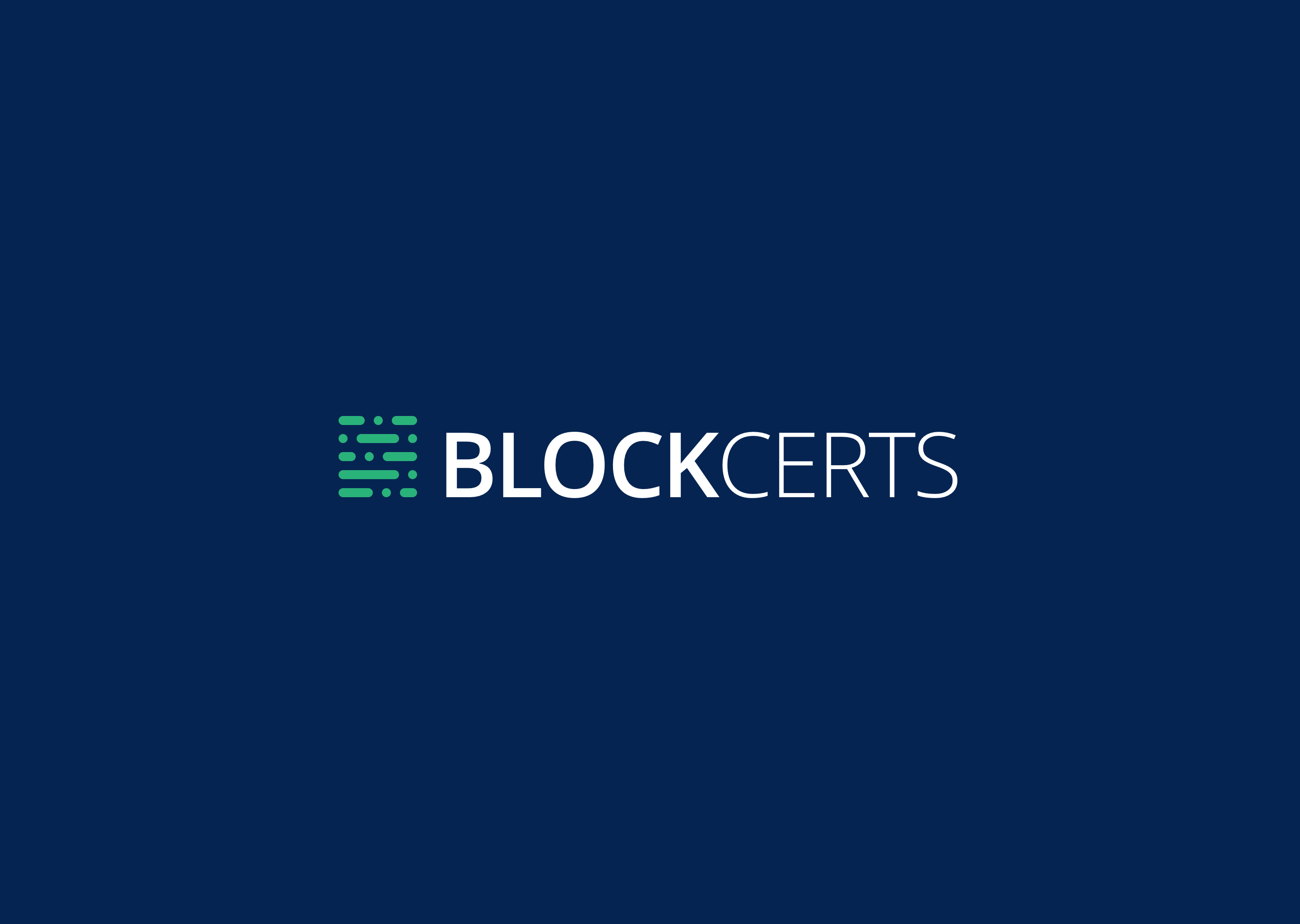
- Blockcerts — An Open Infrastructure for Academic Credentials on the Blockchain From: MIT Media Lab Type: Post Date: 2016-10-25
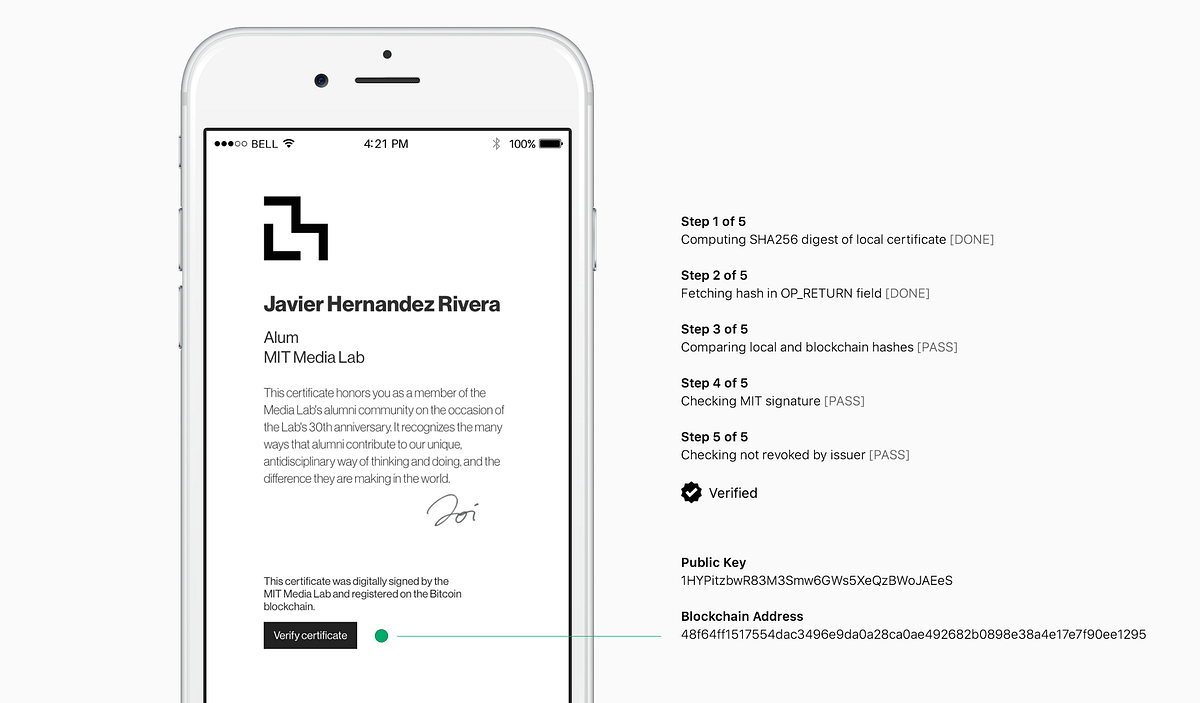
- Top 10 Reasons to Use Blockcerts From: Learning Machine By: Natalie Smolenski Type: Post Date: 2018-05-19
- Blockcerts: The Open Standard for Blockchain Credentials From: SSIMeetup Type: Presentation Date: 2019-10-12
- A Decentralized Approach to Blockcerts Credential Revocation From: WebofTrustInfo Type: Paper Date: 2018-02-09 Event: rwot5-boston
- Blockcerts V3 Proposal - Verifiable Credentials & Decentralized Identifiers From: WebofTrustInfo Type: Paper Date: 2019-12-19 Event: rwot9-prague
open standard for issuing and verifying blockchain-based official records; The project offers open-source libraries, tools, and mobile apps. MIT has issued digital certificates based on this standard.
Blockcerts is an open standard for building apps that issue and verify blockchain-based official records. These may include certificates for civic records, academic credentials, professional licenses, workforce development, and more.
Blockcerts consists of open-source libraries, tools, and mobile apps enabling a decentralized, standards-based, recipient-centric ecosystem, enabling trustless verification through blockchain technologies.
Blockcerts uses and encourages consolidation on open standards. Blockcerts is committed to self-sovereign identity of all participants, and enabling recipient control of their claims through easy-to-use tools such as the certificate wallet (mobile app). Blockcerts is also committed to availability of credentials, without single points of failure.
What would an academic degree look like if it was designed today? Or a professional certificate? These are questions we have been working on over the last year, and we are excited to announce the…
The open standard for issuing blockchain-based records is your easiest bet for creating records that remain verifiable for a lifetime.
<iframe src="//www.slideshare.net/slideshow/embed_code/key/rVC25i8FzeTPiw" width="595" height="485" frameborder="0" marginwidth="0" marginheight="0" scrolling="no" style="border:1px solid #CCC; border-width:1px; margin-bottom:5px; max-width: 100%;" allowfullscreen</iframe
The initial release of the Blockcerts standard and reference implementation described only one revocation mechanism, the issuer-hosted revocation list approach also used by Open Badges. This has known limitations, including: centralization, single point of failure, and inability for a recipient to revoke. Other approaches to revocation were considered, but none were technically or economically feasible at the time given the project goals, including Bitcoin blockchain anchoring, low overhead, and minimal cost.
As the standards around Verifable Credentials are starting to take form, different favors of “verifiable credentials-like” data structures need to make necessary changes to leverage on the rulesets outlined and constantly reviewed by knowledgeable communities such as the W3C. The purpose of this paper is to identify all of the changes needed for Blockcerts to comply with the Verifiable Credentials (VCs) and Decentralized Identifers (DIDs) standards and to expand upon the additional benefits of using a blockchain in combination with Verifiable Credentials. This paper is meant to act as an explainer in which a formal specification can be created. This paper proposes multiple implementation options for several properties. The intention is that we can engage the Blockcerts / Verifiable Credential communities and see what fts best.
Open Badges
- Badges and Blockcerts From: Learning Machine Type: Page Date: 2018-12-13

- Open Badges are Verifable Credentials From: WebofTrustInfo Related: Open Badges Type: Paper Date: 2018-06-22 Event: rwot6-santabarbera
- OPEN BADGES ON THE BLOCKCHAIN From: Draftin Related: Open Badges Type: Paper Date: 2019-07-19
In education and workforce development, it’s important to understand the differences between digital credential formats and how to combine them for greatest impact […]
2011 saw the birth of Open Badges, which digitally and visually convey the achievement of a specific skill. Similar to the Scouts movement, which uses a small fabric symbol to represent specific achievements, digital badges were designed to convey a singular achievement through a digital image and a hosted set of data. Initially spearheaded by the Mozilla Foundation, the Open Badges standard is now maintained by the IMS Global Learning Consortium, ensuring interoperability between platforms. […]
In response to the desire for high-stakes credentials in a digital format, the development of Blockcerts began in 2015 as part of a project by the MIT Media Lab.
The Blockcerts Open Badges Draft Extension introduced a verifcation method based on those used by Verifable Credentials for the specifc use case of blockchain-anchored credentials. This paper expands that work and proposes a new option that can reside alongside existing Open Badges verifcation methods.
This document gives an overview of the status, interesting companies and people regarding Verifiable Open Badges on the Blockchain.
Literature
- Healthcare and Digital Credentials: Technical, Legal, and Regulatory Considerations From: FSMB Type: Report Date: 2019-06
- Security analysis of a blockchain-based protocol forthe certification of academic credentials From: arxiv By: Marco Baldi, Franco Chiaraluce, Migelan Kodra and Luca Spalazzi Related: Open Badges Type: Paper Date: 2019-10-11
Credentials expressed through a trusted identity framework can be accorded a higher value within a social interaction due to the underlying assumption that someone within the system is managing the creation and transfer of these credentials. Within any high functioning identity framework specifications, rules, and agreements based in both technological capacity and social need are necessary to ensure that the level of trustworthiness required by participants in the identity system and the community relying on the services offered by the identity system is met.
Abstract—We consider a blockchain-based protocol forthe certification of academic credentials named Blockcerts,which is currently used worldwide for validating digitalcertificates of competence compliant with the Open Badgesstandard. We study the certification steps that are per-formed by the Blockcerts protocol to validate a certificate,and find that they are vulnerable to a certain typeof impersonation attacks. More in detail, authenticationof the issuing institution is performed by retrieving anunauthenticated issuer profile online, and comparing somedata reported there with those included in the issuedcertificate. We show that, by fabricating a fake issuerprofile and generating a suitably altered certificate, anattacker is able to impersonate a legitimate issuer andcan produce certificates that cannot be distinguished fromoriginals by the Blockcerts validation procedure. We alsopropose some possible countermeasures against an attackof this type, which require the use of a classic public keyinfrastructure or a decentralized identity system integratedwith the Blockcerts protocol.
Adoption
- MIT Launches Blockcerts Certification Using Bitcoin From: Bitcoin.com By: Jamie Redman Type: Post Date: 2016-10-28
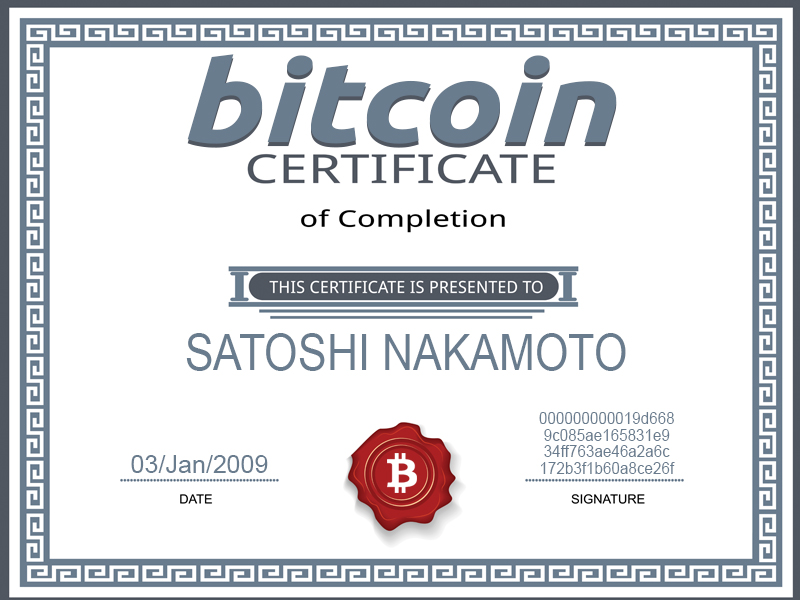
- MIT Introduces Digital Diplomas From: InsideHighered By: Lindsay McKenzie Type: Post Date: 2017-10-19
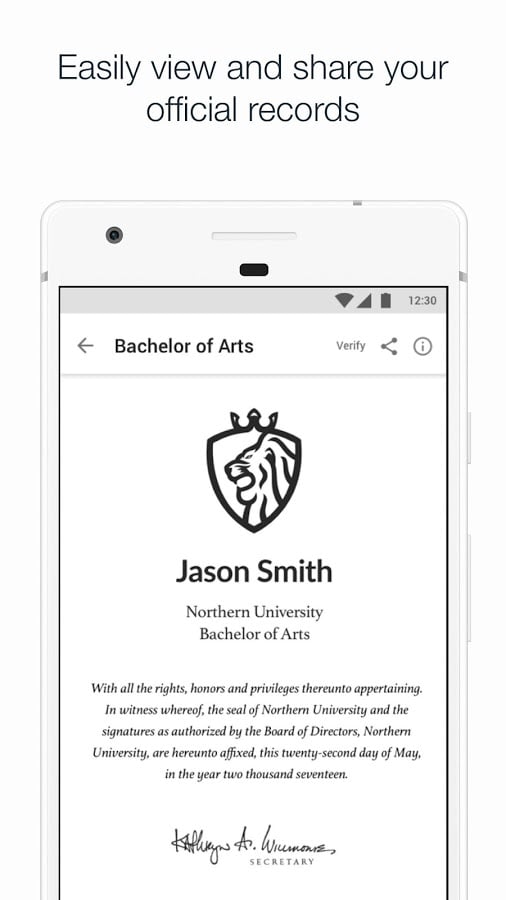
- CXC (Carribean) Pilots E-Certificates on the Blockchain From: CWX Type: Post Date: 2018-10-29
The MIT Media Lab project has already deployed a few instances of blockchain-based digital certificate verification. In October of 2015, the group issued certificates to Media Lab alumni who attended the Lab’s 30th anniversary. The organization Learning Machine also issued HR certificates to employees. MIT’s Global Entrepreneurship Bootcamp workshop in Seoul, South Korea in March 2016 published digital verification using the system. Lastly, Laboratorio para la Ciudad issued digital certificates to workshop participants in Mexico City in September 2015.
The Massachusetts Institute of Technology is offering some students the option to be awarded tamper-free digital degree certificates when they graduate, in partnership with Learning Machine. Selected students can now choose to download a digital version of their degree certificate to their smartphones when they graduate, in addition to receiving a paper diploma.
During the Blockcerts pilot, some 24, 000 candidates who sat the 2018 May/June examinations and for whom CXC has e-mail addresses, will receive credentials to access their e-certificates. The candidates will also receive the traditional paper-based certificate.
Issuing
- Issues Blockcerts using either the Bitcoin or Ethereum blockchain From: Blockcerts Type: Code Date: 2023-05-26
- Command line tools for designing certificate templates and instantiating a certificate batch From: Blockcerts Related: Open Badges Type: Code Date: 2022-04-08
- cert-core From: Blockcerts Type: Code Date: 2022-07-12
The cert-issuer project issues blockchain certificates by creating a transaction from the issuing institution to the recipient on the Bitcoin or Ethereum blockchains. That transaction includes the hash of the certificate itself
Blockcerts V3 is now based off W3C Verifiable Credentials specification and does not follow Open Badges V2 nomenclature anymore. To understand the differences between v2 and v3, please refer to the docs. You may also have a look at the JSONLD and JSON-SCHEMA document
This python library contains common Blockcerts models and accessors used by other Blockcerts python libraries.
Demo
- Example of baking a blockcert into an Open Badge From: Blockcerts Type: Code Date: 2017-07-13
- PoC for Blockcerts with Status List 2021 spec From: Blockcerts Type: Code Date: 2023-03-30
- learningmachine/polymer-redux From: Learning Machine Type: Code Date: 2018-09-28
The cert-issuer project issues blockchain certificates by creating a transaction from the issuing institution to the recipient on the Bitcoin or Ethereum blockchains. That transaction includes the hash of the certificate itself.
An example use-case to showcase the state/view abstraction in Polymer 3, LitElement and Redux context
Verifiable Credentials
- cert-schema From: Blockcerts Type: Code Date: 2023-05-17
- Verifiable Credentials Revocation List 2020 JavaScript implementation From: Blockcerts Type: Code Date: 2023-01-09
- A scaffholding to plug cert-issuer to vc-test-suite From: Blockcerts Type: Code Date: 2023-05-24
- Verifiable Credentials WG Test Suite From: Blockcerts Type: Code Date: 2021-10-31
Blockchain Certificate schemas implement those of Verifiable Credentials. As with Verifiable Credentials, we’ve provided both a JSON-LD context and JSON schema. The purpose of the JSON-LD context is to map types to Internationalized Resource Identifiers (IRIs), providing semantic context for data. The JSON Schema is used for syntactic validation.
@digitalbazaar/vc-revocation-list
This repository contains the W3C Verifiable Credentials Working Group test suite. Any conforming implementation MUST pass all tests in the test suite.
Validation
- The fastest JSON-Schema Validator. Supports draft-06 From: Learning Machine Type: Code Date: 2017-05-09
- Open Badges validation in python From: Blockcerts Related: Open Badges Type: Code Date: 2017-10-06
The fastest JSON Schema validator for node.js and browser with draft 6 support
Open Badges Validator Core is a python package designed to verify the validity of Open Badges based on a variety of input sources and present a useful interface for accessing their properties and validation information. HTTP, Python and command line APIs are provided.
Verification
- A Blockcerts verifier and viewer. From: Blockcerts Type: Code Date: 2023-05-06
- Python library for verifying Blockcerts. From: Blockcerts Type: Code Date: 2020-06-06
- Javascript library for verifying Blockcerts Certificates From: Blockcerts Type: Code Date: 2023-05-05
A standalone universal viewer & verifier for blockcerts credentials
Library for verifying blockchain certificates.
IMPORTANT NOTE: as of version 5 of this library, v1 blockcerts are not supported anymore. Use https://www.npmjs.com/package/@blockcerts/cert-verifier-js-v1-legacy if needed.
Apps
- A web app for viewing and validating Blockchain Certificates From: Blockcerts Type: Code Date: 2018-05-10
- An Android app for Blockcerts. From: Blockcerts Type: Code Date: 2023-02-24
- An iOS wallet for viewing, validating, and sharing certs From: Blockcerts Type: Code Date: 2022-09-19
- An iOS wallet for Blockcerts. From: Blockcerts Type: Code Date: 2022-02-17
The cert-viewer project is a Flask webapp to display and verify blockchain certificates after they have been issued and to allow learners to request a certificate and generate their own Bitcoin identity needed for the certificate creation process.
Blockcerts Android application by Learning Machine
This repository contains the core modules used to implement Blockcerts functionality in iOS.
Blockcerts mobile app for iOS to receive and share certificates that are verifiable via the blockchain


